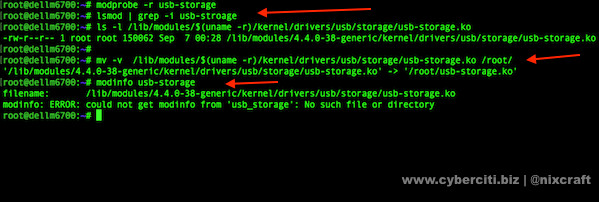https://www.cyberciti.biz/faq/linux-disable-modprobe-loading-of-usb-storage-driver
In our research lab, would like to disable all USB devices connected to our HP Red Hat Linux based workstations. I would like to disable USB flash or hard drives, which users can use with physical access to a system to quickly copy sensitive data from it. How do I disable USB device support under CentOS Linux, RHEL version 5.x/6.x/7.x and Fedora latest version?
The USB storage drive automatically detects USB flash or hard drives. You can quickly force and disable USB storage devices under any Linux distribution. The modprobe program used for automatic kernel module loading. It can be configured not load the USB storage driver upon demand. This will prevent the modprobe program from loading the usb-storage module, but will not prevent root (or another privileged program) from using the insmod/modprobe program to load the module manually. USB sticks containing harmful malware may be used to steal your personal data. It is not uncommon for USB sticks to be used to carry and transmit destructive malware and viruses to computers. The attacker can target MS-Windows, macOS (OS X), Android and Linux based system.
All you have to do is disable or remove the usb-storage.ko driver to restrict to use USB devices on Linux such as:
Please note that you can use : a shell builtin or /bin/true.
Type the following command under CentOS or RHEL 6.x/7.x or newer (including the latest version of Fedora):
Save and close the file. Now the driver will not load. You can also remove USB Storage driver without rebooting the system, enter:
Sample outputs:
Edit or append as follows:
For grub2 use /etc/default/grub config file under Fedora / Debian / Ubuntu / RHEL / CentOS Linux. I strongly suggest that you read RHEL/CentOS grub2 config and Ubuntu/Debian grub2 config help pages.
In our research lab, would like to disable all USB devices connected to our HP Red Hat Linux based workstations. I would like to disable USB flash or hard drives, which users can use with physical access to a system to quickly copy sensitive data from it. How do I disable USB device support under CentOS Linux, RHEL version 5.x/6.x/7.x and Fedora latest version?
The USB storage drive automatically detects USB flash or hard drives. You can quickly force and disable USB storage devices under any Linux distribution. The modprobe program used for automatic kernel module loading. It can be configured not load the USB storage driver upon demand. This will prevent the modprobe program from loading the usb-storage module, but will not prevent root (or another privileged program) from using the insmod/modprobe program to load the module manually. USB sticks containing harmful malware may be used to steal your personal data. It is not uncommon for USB sticks to be used to carry and transmit destructive malware and viruses to computers. The attacker can target MS-Windows, macOS (OS X), Android and Linux based system.
usb-storage driver
The usb-storage.ko is the USB Mass Storage driver for Linux operating system. You can see the file typing the following command:# ls -l /lib/modules/$(uname -r)/kernel/drivers/usb/storage/usb-storage.koAll you have to do is disable or remove the usb-storage.ko driver to restrict to use USB devices on Linux such as:
- USB keyboards
- USB mice
- USB pen drive
- USB hard disk
- Other USB block storage
How to forbid to use USB-storage devices on using fake install method
Type the following command under CentOS or RHEL 5.x or older:# echo 'install usb-storage : ' >> /etc/modprobe.conf Please note that you can use : a shell builtin or /bin/true.
Type the following command under CentOS or RHEL 6.x/7.x or newer (including the latest version of Fedora):
# echo 'install usb-storage /bin/true' >> disable-usb-storage.confSave and close the file. Now the driver will not load. You can also remove USB Storage driver without rebooting the system, enter:
# modprobe -r usb-storage
# mv -v /lib/modules/$(uname -r)/kernel/drivers/usb/storage/usb-storage.ko /root/
##################
#### verify it ###
##################
# modinfo usb-storage
# lsmod | grep -i usb-storage
# lsscsi -HSample outputs:
Blacklist usb-storage
Edit /etc/modprobe.d/blacklist.conf, enter:# vi /etc/modprobe.d/blacklist.confEdit or append as follows:
blacklist usb-storageSave and close the file.
BIOS option
You can also disable USB from system BIOS configuration option. Make sure BIOS is password protected. This is recommended option so that nobody can boot it from USB.Encrypt hard disk
Linux supports the various cryptographic techniques to protect a hard disk, directory, and partition. See "Linux Hard Disk Encryption With LUKS [ cryptsetup Command ]" for more info.Grub option
You can get rid of all USB devices by disabling kernel support for USB via GRUB. Open grub.conf or menu.lst and append "nousb" to the kernel line as follows (taken from RHEL 5.x):kernel /vmlinuz-2.6.18-128.1.1.el5 ro root=LABEL=/ console=tty0 console=ttyS1,19200n8 nousbMake sure you remove any other reference to usb-storage in the grub or grub2 config files. Save and close the file. Once done just reboot the system:
# rebootFor grub2 use /etc/default/grub config file under Fedora / Debian / Ubuntu / RHEL / CentOS Linux. I strongly suggest that you read RHEL/CentOS grub2 config and Ubuntu/Debian grub2 config help pages.


No comments:
Post a Comment